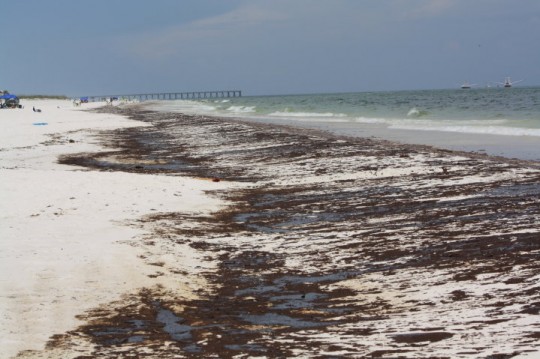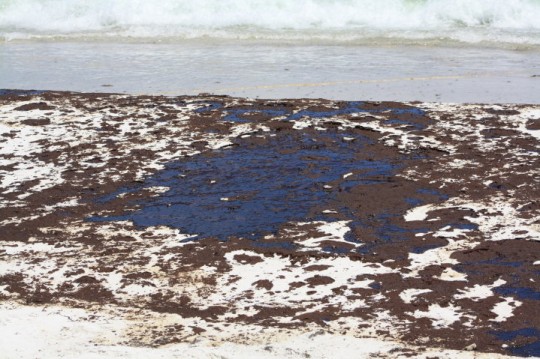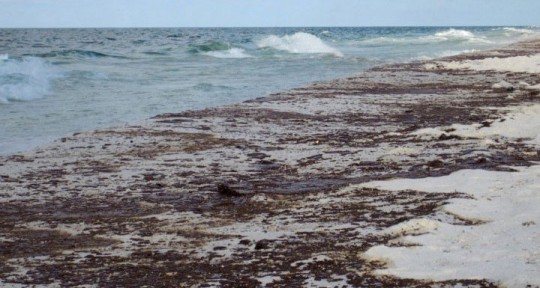Florida Gets $3 Billion In BP Settlement; Escambia To See $58 Million In RESTORE Funds
July 3, 2015
Florida will land about $3.25 billion as part of a multi-state federal settlement with BP over widespread damages caused by the 2010 Deepwater Horizon disaster.
Florida stands to receive $2 billion for economic damages, the most of any Gulf Coast state, and $680 million for restoration projects. The deadly explosion aboard the Deepwater Horizon drilling rig and ensuing massive spill affected the environment, tourism and the fishing industry along the Gulf of Mexico but its effects rippled throughout the state.
Florida is also in line for $572 million as part of the 2012 Resources and Ecosystems Sustainability, Tourist Opportunities, and Revived Economies of the Gulf Coast States (RESTORE) Act, with that figure potentially growing to $1.25 billion. Escambia County is expected to receive at least $58 million in RESTORE funds over the next several years. That money is in addition to the $10.5 million Escambia County was already set to receive.
The deal announced Thursday requires London-based BP to pay $18.5 billion in economic and natural resources damages to the five Gulf Coast states affected by the disaster, which pumped at least 3.9 million gallons of oil off the coastlines of Alabama, Florida, Louisiana, Mississippi and Texas.
Sen. Don Gaetz, who as Senate president pushed for the creation of a consortium to oversee the bulk of the settlement funds, said the money will help boost economic development throughout the Panhandle, now largely reliant on tourism and the military industry.
“This could be game changer,” said Gaetz, a Republican from Niceville. “Just as the Deepwater Horizon was the worst economic disaster to befall our area, this settlement could be the best economic opportunity in our times. This kind of money allows you to build out our current economy in northwest Florida, as well as being able to development entire economic sectors that don’t exist today.”
Triumph Gulf Coast Inc., a non-profit corporation created by the Legislature in 2013, will manage 75 percent of the economic damages money. Triumph, set up to help the eight Panhandle counties most economically impacted by the spill, is expected to award the money over 30 years for recovery efforts. The legislature will distribute the remaining 25 percent.
“This agreement will help Florida implement key projects and invest in environmental priorities to keep our state beautiful,” Gov. Rick Scott said in a release.
Under the agreement, Florida will receive an initial payment of $400 million next year, with subsequent disbursements of about $100 million annually through 2033.
The governor’s office and other state environmental agencies deferred to the attorney general’s office when asked how the state would use the money.
“We will be working closely with our partner agencies to determine the next steps moving forward,” Florida Fish and Wildlife Conservation Commission spokeswoman Katie Purcell said.
Attorney General Pam Bondi announced the settlement during a press conference at the Port of Tampa Bay on Thursday.
Environmentalists, still reeling from how the Legislature divvied up voter-approved water and land conservation money for the new budget year, are hopeful that the BP cash will be used appropriately as it’s slowly dispersed over the next two decades.
With $2 billion earmarked for economic recovery efforts, Audubon Florida Executive Director Eric Draper said that the remainder of the spending should be steered toward environmental projects.
“Although Florida wasn’t impacted by that much oil, we have significant amount of environmental degradation associated with water quality problems and even lack of fresh water flow,” Draper said. “This money could be spent anywhere from the Caloosahatchee River all the way to the Panhandle.”
The agreement — potentially the largest environmental settlement in U.S. history — is “an unprecedented opportunity to accelerate and expand the response to the devastating harm caused by the spill, and to build lasting resilience into the essential ecosystems of the Gulf,” a group of national and local environmental organizations said in a joint press release.
“While we await key details, one thing is clear: As soon as the settlement is final, it will be time to put that money to work,” the statement from the Environmental Defense Fund, National Wildlife Federation, National Audubon Society, Ocean Conservancy, The Nature Conservancy, Coalition to Restore Coastal Louisiana and Lake Pontchartrain Basin Foundation said.
Business lobbying groups also hailed the settlement.
“Five years after the Deepwater Horizon oil spill, we still do not know the extent of the damage done to the Gulf, however this is a first step in making our industry whole,” Carol Dover, president and CEO of the Florida Restaurant and Lodging Association, said in a press release.
BP, which has spent more than $20 billion responding to the spill and claims, saw its value drop by a third after the maritime disaster.
The agreement is “a path to closure for BP and the Gulf,” BP Chairman Carl-Henric Svanberg said in a statement.
“It resolves the company’s largest remaining legal exposures, provides clarity on costs and creates certainty of payment for all parties involved,” Svanberg said. “In deciding to follow this path, (BP) has balanced the risks, timing and consequences associated with many years of litigation against its wish for the company to be able to set a clear course for the future.”
In April 2013, Bondi filed a lawsuit against BP Exploration & Production Inc., BP America Production Co., and Halliburton Energy Services, Inc., seeking $5.48 billion for lost revenue — past and future — from the Deepwater Horizon oil spill.
The lawsuit sought actual and potential lost tax revenue caused by the spill. Bondi filed the lawsuit after the company ignored a settlement offer.
Thursday’s announced settlement with BP doesn’t end the state’s lawsuits against rig owner TransOcean and contractor Haliburton Energy Services. The agreement also doesn’t help those who opted out of a 2012 class action settlement to pursue individual property damage and medical claims.
The portion of the settlement dealing with the economic loss claims still requires final approval from all of the parties involved, and a consent decree dealing with natural resources damages and Clean Water Act claims will require court approval.
by Jim Turner, The News Service of Florida. NorthEscambia.com also contributed to this report.
Pictured top and insets: Oil on Pensacola Beach. Pictured below: Protective oil boom in Pensacola Bay. NorthEscambia.com photos, click to enlarge.
Comments
10 Responses to “Florida Gets $3 Billion In BP Settlement; Escambia To See $58 Million In RESTORE Funds”






We the people will be very very lucky to see any “on-the-ground” finished projects from this money.
Just the salaries and expense to run the “special” non-profit Triumph Gulf Coast Inc. to be the overseer of the funds will eat up tens of millions over 30 years.
Pam Bondi said 25% of the Florida settlement goes to the lawmakers to decide how to spend it. That percentage is outrageous. They shouldn’t get any. It should go to benefit the citizens of coastal Florida and the lawmakers can be included in that group.
yes i hope this money doesnt go into to county pickets to.all the miiions they got before,they never said what it went to.they should have to account for every penny spent. all they care about is the tourists,fix the beaches and county roads and building bridges.
Every bit of this money should be spent on a BEAUTIFUL bridge between the mainland and Gulf Breeze. The traffic is horrible. A normal bridge will make the island ugly.
@ Concerned….
You don’t recall all the horrible oil damage that Miami-Dade, St. Pete, and other counties got..?
I think in Alabama even if you lived in Huntsville you could claim damages.
Too bad the oil didn’t dissolve as quickly as the money is going.
You mean that the economic and environmental damage to escambia county only amounts to 1.8% of the total? What the heck?
@ Jane….AGREE 100%
You can bet that before the first drop of oil ever surfaced that some of our leadership and community minded entrepreneurs were hard at working on plans how to BEST use the Public Money that would eventually be coming.
Maybe this time some honest persons will be in charge of letting the public know what is being spent and for what and who eventually goes to the bank to make a deposit…or a trade for something.
HEAR, HERE…JANE…HEAR, HERE
Since Olive Road is a state road let’s hope they can spend a little money on it.Olive Road is an embarrassment to Escambia County.
I hope this money actually goes to fix some of the damage, and not in someone’s pocket, or to advertise for tourists to come here!